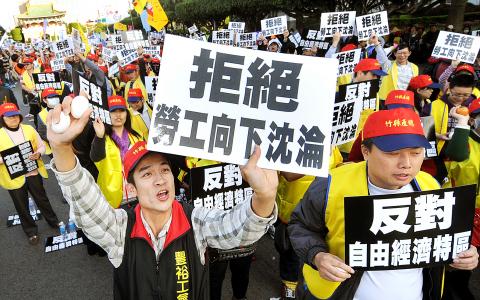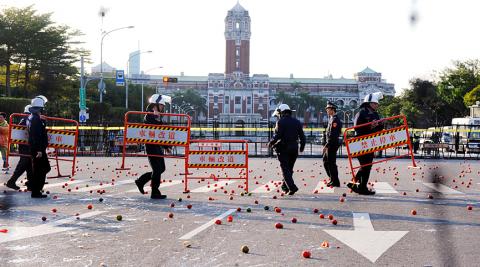Thousands of people from workers’ unions and labor groups took to the streets in Taipei yesterday, demanding that the government protect workers’ rights.
Initiated by the National Federation of Independent Trade Unions (NAFITU), workers organized by more than a dozen groups from across the country arrived at Taipei’s Ximending (西門町) at noon yesterday and headed out to the streets holding signs bearing their demands, such as “basic guarantees,” “uncut payment” and “against the free-trade island [policy] and worsening labor conditions.”
The NAFITU said President Ma Ying-jeou (馬英九) had spoken about the government’s plan for leading the nation to become a “free-trade island,” increasing collaboration between industry and schools and reforming the labor insurance annuity scheme in his speech on New Year’s Day.

Photo: Fang Pin-chao, Taipei Times
However, these policies should not be achieved by sacrificing the working conditions in Taiwan — such as reforming labor insurance by cutting the basic payments for retired workers, or cooperating with the business sector to turn students into cheap labor for companies, it said, adding that the march aimed to make it clear to the president that workers will not accept reforms that only benefit corporations.
NAFITU president Chu Wei-li (朱維立) said the protest appealed for five demands: not cutting the labor insurance annuity payment, basic guarantees for retirement, government budget appropriation to supplement the Labor Insurance Fund if it fails to provide basic guaranteed payments, not loosening labor regulations for a free economic demonstration zone and amending Article 28 of the Labor Standards Act (勞動基準法).
The groups said that the minimum monthly retirement payment from the labor insurance annuity is currently only NT$5,183 after working for 15 years and NT$8,733 after working for 30 years, and an average worker receives only about NT$13,000 — all lower than the government’s data from last year, which showed the average living expenses in Taiwan total about NT$18,465 a month.

Photo: Lo Pei-der, Taipei Times
They urged the government not to cut the labor insurance annuity payment, which is already not enough to maintain average living standards, and said it should guarantee a basic living by supplementing the payment with government funding or from taxes imposed on employers and company owners.
Following the march, the protesters converged in front of the Presidential Office on Ketagalan Boulevard, where the event organizers staged a skit and delivered speeches. The demonstration ended peacefully after the protesters, having been given two warnings by the police that they were violating the Assembly and Parade Act (集會遊行法), threw tomatoes and eggs toward the Presidential Office, from which they were separated by barricades and police.
“We have not seen the government announce policies protecting workers’ rights, nor any sincerity toward workers,” Taoyuan International Airport Services Union standing director Yang Shao-yung (楊少庸) said, adding that despite the large number of protesters, the government failed to even send out an official to meet with them.
“Today we used only tomatoes to express our anger and dissatisfaction. Further demonstrations on larger scales may be held in the future,” he said.

SECURITY: As China is ‘reshaping’ Hong Kong’s population, Taiwan must raise the eligibility threshold for applications from Hong Kongers, Chiu Chui-cheng said When Hong Kong and Macau citizens apply for residency in Taiwan, it would be under a new category that includes a “national security observation period,” Mainland Affairs Council (MAC) Minister Chiu Chui-cheng (邱垂正) said yesterday. President William Lai (賴清德) on March 13 announced 17 strategies to counter China’s aggression toward Taiwan, including incorporating national security considerations into the review process for residency applications from Hong Kong and Macau citizens. The situation in Hong Kong is constantly changing, Chiu said to media yesterday on the sidelines of the Taipei Technology Run hosted by the Taipei Neihu Technology Park Development Association. With

CARROT AND STICK: While unrelenting in its military threats, China attracted nearly 40,000 Taiwanese to over 400 business events last year Nearly 40,000 Taiwanese last year joined industry events in China, such as conferences and trade fairs, supported by the Chinese government, a study showed yesterday, as Beijing ramps up a charm offensive toward Taipei alongside military pressure. China has long taken a carrot-and-stick approach to Taiwan, threatening it with the prospect of military action while reaching out to those it believes are amenable to Beijing’s point of view. Taiwanese security officials are wary of what they see as Beijing’s influence campaigns to sway public opinion after Taipei and Beijing gradually resumed travel links halted by the COVID-19 pandemic, but the scale of

A US Marine Corps regiment equipped with Naval Strike Missiles (NSM) is set to participate in the upcoming Balikatan 25 exercise in the Luzon Strait, marking the system’s first-ever deployment in the Philippines. US and Philippine officials have separately confirmed that the Navy Marine Expeditionary Ship Interdiction System (NMESIS) — the mobile launch platform for the Naval Strike Missile — would take part in the joint exercise. The missiles are being deployed to “a strategic first island chain chokepoint” in the waters between Taiwan proper and the Philippines, US-based Naval News reported. “The Luzon Strait and Bashi Channel represent a critical access

Pope Francis is be laid to rest on Saturday after lying in state for three days in St Peter’s Basilica, where the faithful are expected to flock to pay their respects to history’s first Latin American pontiff. The cardinals met yesterday in the Vatican’s synod hall to chart the next steps before a conclave begins to choose Francis’ successor, as condolences poured in from around the world. According to current norms, the conclave must begin between May 5 and 10. The cardinals set the funeral for Saturday at 10am in St Peter’s Square, to be celebrated by the dean of the College